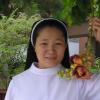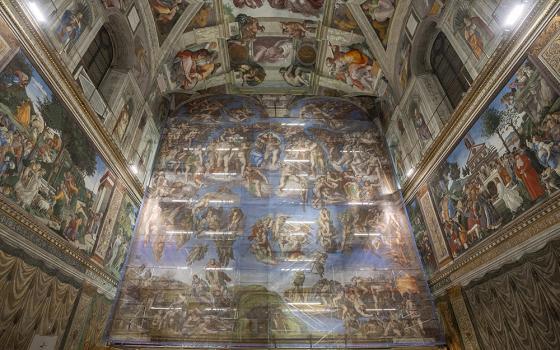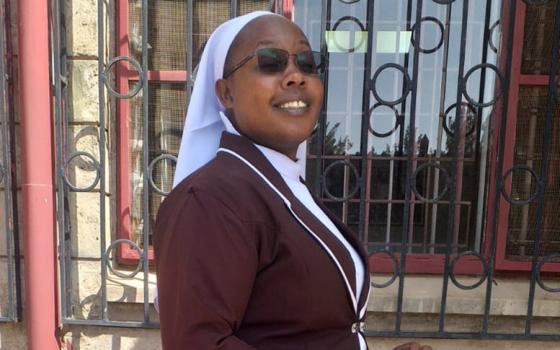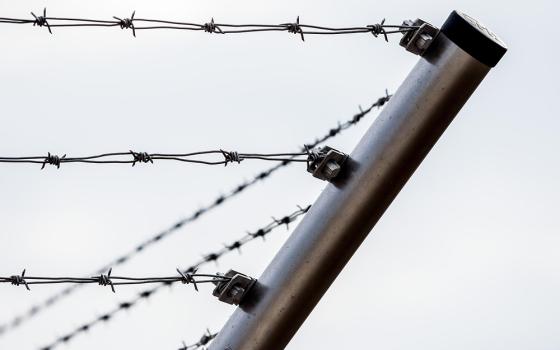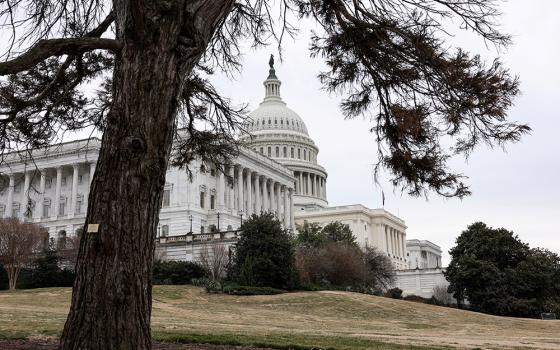
A combination photo shows St. Peter’s Basilica and the logo chosen by the Vatican for the Holy Year 2025. Following Pope Francis' invitation to "be tangible signs of hope" for those experiencing hardships, Sr. Mary Nguyen made a pilgrimage to visit a friend. (OSV News/Catholic Press Photo/Massimiliano Migliorato)
The Jubilee Year 2025, which began in December 2024, is now nearing its end. However, there is still time for me to reflect and live this Holy Year meaningfully. The Jubilee is a major milestone in my journey of faith, marking a time to meditate on my relationship with God and the people around me.
The Holy Year is a time of grace that God bestows each of us, through which we can open our hearts to renewal and repentance, and receive God's forgiveness. Looking back I ask myself how I have lived during this time, have I truly lived according to the Gospel values that God wants me to practice? Have I learned how to love and care for others, especially those who suffer and live in difficult circumstances?
Pope Francis, in this Holy Year with the theme "Pilgrims of Hope," invited the faithful all over the world to "be tangible signs of hope for those of our brothers and sisters who experience hardships of any kind" (Spes Non Confundit). This invitation made me realize that when I live and practice mercy, I am aiding those who face suffering and feel that life is unbearable. Therefore, I decided to make a pilgrimage to visit those who are in need.

Pope Francis pushes open the Holy Door of St. Peter's Basilica at the Vatican Dec. 24, 2024, inaugurating the Holy Year 2025. (CNS/Cristian Gennari, pool)
A characteristic of the Jubilee is pilgrimage. On this occasion, the sisters in my community visit famous pilgrimage centers in Vietnam such as La Vang Holy Land (Hue Diocese), Tac Say (Can Tho Diocese), and Saigon's Notre Dame Cathedral. As for me, I chose to make a pilgrimage to visit a friend — a 50-year-old Catholic woman who lives in the Can Tho Diocese of Soc Trang Province in Vietnam — nearly 300 kilometers away, about five hours by car.
She used to be a novice when I was a postulant in my Dominican congregation. But before making her first profession in 2003, she discerned a call to enter a cloistered Dominican monastery. She had a strong desire to dedicate herself to God in consecrated life, but God chose a different path for her.
Before making final profession in the cloister, she had a minor stroke and was diagnosed with two tumors in her head. This prevented her from continuing religious life, and she returned to her family to live a celibate life.
Although she no longer lives in a religious community, she still maintains the discipline of daily prayer and continues to dress like a cloistered nun. Because of her health, she cannot do things for herself — such as washing clothes, cleaning her room or boiling water to prepare milk. Therefore, all her personal activities, even her medical expenses, depend on the support of her sister, her sister-in-law and her mother. Every day, she takes a tram to church to attend Mass and spends an hour in personal prayer afterward. She uses a cane to move around the house.
After 20 years without contact, seeing her again was deeply moving. She now looks older than her age. We were both very happy to meet again and recalled the joyful days of our formation. At that time, the community's economy was difficult. Besides prayer and study, we worked hard growing vegetables, raising pigs, baking cakes and teaching. Yet we did not feel burdened — instead, we felt joyful and happy in our vocation.
Advertisement
There is one question she always wondered and asked me while we confided in each other: "Why did you remember me?" I only replied, "God sent me to you." I really don't know why, but every time I prayed before the Blessed Sacrament, God brought her to my mind. So I decided to find a way to contact her and visit during this Holy Year.
She also shared that when she learned her illness would prevent her from continuing religious life, she was extremely shocked, yet she continued to trust deeply that God would not abandon her. Since returning home to her family, she has been visited and supported — spiritually and materially — by priests, sisters and Dominican brothers. Meeting me again after more than 20 years, she once again affirmed that God has never abandoned her.
"There is one question she always wondered and asked me while we confided in each other: 'Why did you remember me?' I only replied, 'God sent me to you.' "
Visiting her during this Jubilee, I encouraged her to have more hope, reminding her that God is always with her through others. Before I visited, the sisters in my community and those in the cloistered order sent their regards, encouragement, cakes and money. They asked me to tell her that they always remember her in their daily prayers. Receiving these gifts, she was deeply moved and closed her eyes to pray, saying, "Thank you, God, for sending these sisters to me." I was truly touched by her prayer of gratitude
This visit was very meaningful to me because it reminded me of the miraculous presence of God in my encounter with my friend after 20 years. I felt as if God had arranged our meeting. I was so happy because I experienced that God always accompanies us on our journey of faith every day.
In particular, through this encounter, I learned from my friend the perseverance to trust and rely on God when faced with suffering. She always willingly accepted God's will for her life. During her youth, she devoted her abilities and health to two religious orders, until illness forced her to return home and depend on her family's care. However, she never complained. She remained optimistic and believed that God loved her in his own way. He never abandoned her, as St. Paul said, "We know that all things work for good for those who love God, who are called according to his purpose" (Romans 8:28).
